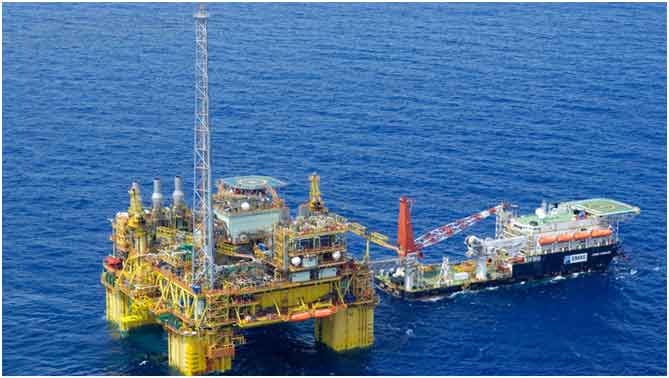Oil Demand Could Fall Without Climate Solution, Warns Shell
By Ed King
13 March, 2015
RTCC.org

Shell’s Gumusut-Kakap platform operates off the coast of Sabah, Malaysia (Pic: Shell/Flickr)
Demand for oil and gas could fall if major producers fail to find economically viable and publicly acceptable ways of cutting their climate-warming gas emissions, Shell has warned.
The oil giant revealed its fears in its Strategic Report, released on March 12, 2015, telling investors that new climate change regulations “may result in project delays and higher costs.”
“Furthermore, continued and increased attention to climate change, including activities by non-governmental and political organizations, as well as more interest by the broader public, is likely to lead to additional regulations designed to reduce greenhouse gas emissions,” it said.
In the past 12 months World Bank and Bank of England have warned that some fossil fuel assets may be “stranded” as a result of new climate laws which mean they cannot be burnt.
But only last year Shell executive vice president JJ Traynor dismissed the idea of a carbon bubble as “alarmist” and said the theory had “fundamental flaws”.
New technology
In his foreword, Shell chairman Jorma Ollila said carbon pricing and technology to capture emissions remained the best ways to address climate change, but both needed “widespread” government support.
“I was encouraged to hear at the United Nations Climate Summit in New York in September 2014 that the need for effective carbon pricing systems had broad support,” he wrote.
“I hope that significant progress can be made on this at the crucial UN Climate Change Conference in Paris in December 2015.”
In 2014 the company recorded an improvement in earnings, US$19.0 billion compared with $16.7 billion in 2013, on a current cost of supplies basis.
But like other oil companies, Shell has been hit hard by the dramatic fall in prices for crude, with its share prices underperforming over the past 12 months.
“We generally test projects and other opportunities against a long-term price range of $70-110 per barrel,” it said, significantly above the current price of $60 per barrel.
Shell also announced capital investment for 2015 would be lower than the $35 billion in 2014.
Despite the threat of increased regulations as a result of a proposed global climate pact, Shell said its investments in natural gas, biofuels and carbon, capture and storage (CCS) place it in a strong position for growth into the 2020s.
In 2014 the company secured millions of pounds of UK government funding for a pilot CCS plant in Scotland, which aims to be the world’s first scale project at a gas-fired power station.
“We expect that, in combination with renewables and use of CCS, natural gas will be essential for significantly lower CO2 emissions beyond 2020.
“Withhell’s leading position in liquified natural gas (LNG) and new technologies for recovering gas from tight rock formations, we can supply natural gas to replace coal in power generation.”
New equipment to tackle spills would also allow it to drill for oil in the Arctic in 2015, the company said, an area it classes as one of its “future opportunities” and “resource plays”.
“Large reserves” in Iraq, Kazakhstan and Nigeria could also come available it added.
*Responding to Climate Change (RTCC), http://www.rtcc.org/2015/03/12/shell-warns-oil-demand-could-fall-without-climate-solution/
.
Comments are moderated

